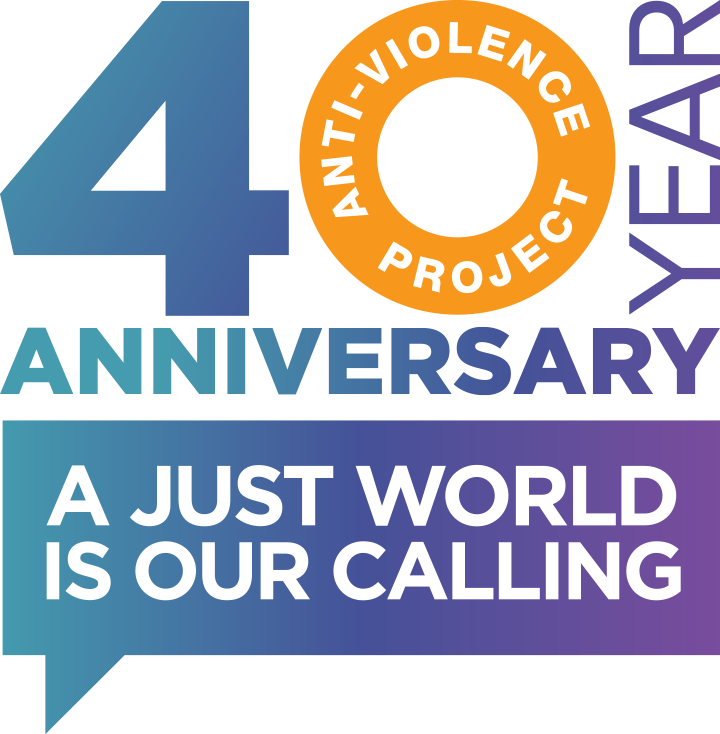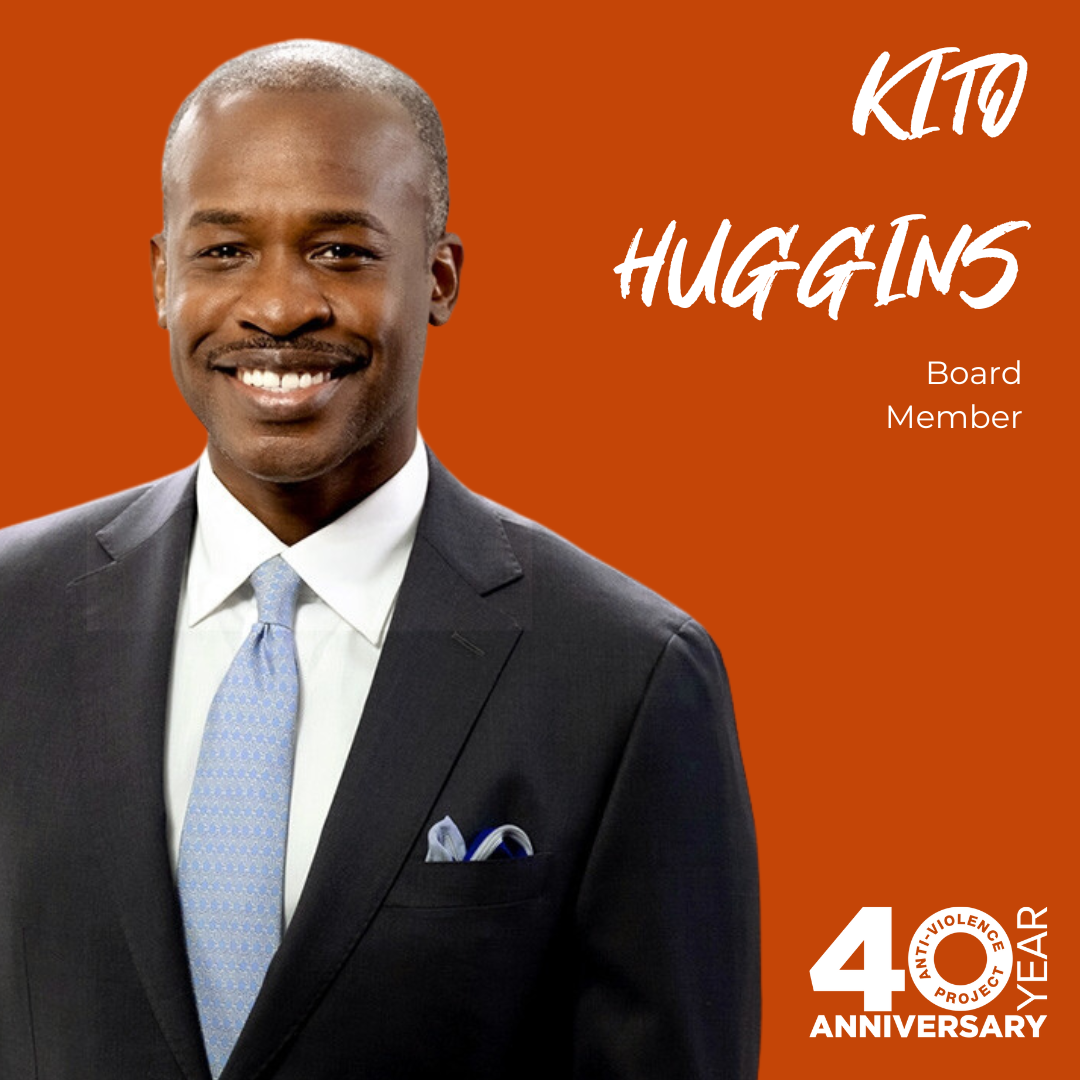
This interview has been shortened and condensed for clarity.
Richard Haymes, one of AVP’s previous Executive Directors, didn’t always consider himself an activist. His work at AVP spanned a variety of programs and initiatives including working with LGBTQ+ survivors and victims of 9/11. Richard worked to stay flexible and create new avenues for change and advocacy at AVP. Making sure everyone at AVP had a voice and the ability to openly talk about what they witnessed was an important part of his work.
“Back then, it was like the dark ages in terms of how gay people, trans people, queer people were treated by the police and the court system.” Here Richard discusses his tenure as an Executive Director, his vision, the term “activist,” the change that has happened, and the work that still needs to be done.
How did you first get involved with AVP?
My first dealing with AVP was on a personal level. But I wasn’t even, if you can call an activist in quotes, at that point. Then when I left graphic design and decided I wanted to do something else with my life, I joined the clinic, which was the Community Health Project (CHP) at the time. It was in The Center and it was right next door to AVP’s first office., so I became close with Matt Foreman. Then I stayed with CHP for about 13 years. As the Associate Executive Director, I got to design programs because I was lucky enough to have a boss who let me just run with whatever. We needed a youth program so I started that. We needed a trans program so we started the trans program. And we needed a women’s program. And then, because we had started the first HIV primary care program in the country with Bellevue Hospital, there weren’t enough spots in that program, so I created a holding pattern for people who were eligible for the program but couldn’t get in it. So they had their own little pod of people.
Wayne Kuatler approached me, he was on the board of AVP and he said, “Chris Quinn (AVP’s ED at the time) is running for city council. I’d like you to interview for the job.” So I’ve always loved AVP and the work it did, but I didn’t know how qualified I was. I answered all their questions and I was honored to have been asked. They called me about a week later and said, “We’d like to offer you the job.” So leaving CHP turned out to be the hardest thing I ever did professionally because I had grown so much and I had done so many things and worn so many hats there. And I was in the middle of getting my master’s in nonprofit management at NYU.
When I talked during the interview, I said, “To me, AVP is always focused on the criminal justice aspects of violence against and within the community.” And I said, “But my background has been healthcare and I really see that violence is a public health issue. On top of it being a criminal justice issue for that victim, it also keeps us all in the closet or afraid to have public displays of affection or to stay out of certain neighborhoods, or just to live our lives openly.” So I said, “Just be prepared that if you hire me, one of my focuses will be to expand. It’s not changing the mission, but it’s just, I want all the programs to reflect prevention and community awareness and things like that.
So they hired me.
What was your focus during your time at AVP?
I think that they really liked the idea of prevention, of being out in the community, not just dealing with victims day in and day out, even though someone had to be there, but there were so many other ways to help.
The first thing I did was change my office. I divided that into three offices so people could have a place to be that they could close the door if they needed. I said, “The only thing I don’t want to hear ever from anybody is, ‘But that’s the way we’ve always done it.'” Because that to me, is the kiss of death for an organization. They used to use leeches and whatever, but that’s not the way we do it now.
So what’s the best practice one day might be different the next, so let’s be flexible and open to learning and not think that we’re the experts. Sometimes the client is the expert. Sometimes the other smaller groups that we’re working with are experts because something’s happened that we haven’t faced. And so we have to be elastic and that’s the way I always built programs. So it was always a collective process. We had a staff meeting and we divided the whole staff into various teams that were all crossovers so people from every department were on each team and they selected a leader for their team. It was all very much to break down hierarchy and all that and to give the people that wouldn’t normally speak up a voice.
How long overall were you involved with AVP?
At that time, I was the longest-serving Executive Director. I left in 2005, so that was seven years.
What have you taken with you from your time at AVP?
Once a year, all the EDs of the various organizations would meet in Washington. And because we were pretty much running the national coalition, we went to it and the facilitator asked the question, “Why are you an activist?” And when it got to me, I said, “I never thought of myself as an activist.”
Ann Northrop is one of the founders of Act Up, and she was on Gay USA and she’s brilliant. She had left CBS news to work as an activist. And she was like, “Are you out of your mind? Of course you’re an activist.” If I had to list all the adjectives about me, that wouldn’t have even been on it because I never did what I did thinking of it as activism. I thought of it as service delivery. And I knew too many people who died with their boots on, who stayed too long.
Do you have any memories that stick with you from your time at AVP?
Well, it was an awful time because I was there on 9/11. And it was the first time that we [AVP staff] were victims along with our clients being victims, which is very different for a service provider when they’re feeling the terror and the victim is coming in, doubly terrorized from what’s going on in their lives, and also what has just happened in the world. So I had a social worker come in and meet with the staff every week and talk about things and then would see them individually if they wanted. So I felt good about recognizing it. I also felt good that we were the first organization to put out a statement saying, “Don’t use this as an opportunity to be anti-Muslim,” and got hell for that.
And then when the war in Iraq started, together as senior staff, we wrote an anti-war policy. Since we’re the anti-violence program, it’s hard to be pro-war and anti-violence. So it’s small victories.
After 9/11, a team from AVP went to the NYC Department of Health on Worth Street at Ground Zero to help victims sign up for benefits—Survivors Benefits, Workers Comp, Social Security, etc,…a service we provided at our offices if clients wanted to file for them.
It was clear that heterosexual surviving partners… were getting many more benefits from the City, State, and Red Cross than same-sex surviving partners were. We knew how to advocate for our clients with the City and State, but had never worked with discrimination from the Red Cross. Matt Foreman and I and others got an appointment with the head of the Red Cross at his headquarters on the Upper West Side. With one meeting, we were able to change his position and he set in motion changes in Red Cross policies towards working with victims who identified as lesbian, gay, transgender or bisexual. So that was another high spot of my time at AVP.




